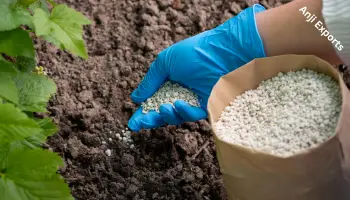Fertilizers

Our Fertilizers Exports Include
Primary Nutrients
Plants need various essential nutrients for growth and development, categorized into primary, secondary, and micronutrients. Primary nutrients, which are crucial for vital processes, are required in large quantities. While plants typically absorb these nutrients from the soil or air, these natural sources often fall short for optimal growth. As a result, chemical fertilizers are used to supplement these nutrients in crops.
DAP 18-46-0
DAP (Diammonium phosphate) is a concentrated phosphate-based fertilizer. Phosphorus is an essential nutrient along with Nitrogen and plays a vital role in the development of new plant tissues and the regulation of protein synthesis in crops. Product Nutrients: Nitrogen & Phosphorus
Neem Coated Urea (N)
Neem Coated Urea (N) is a specialized agricultural fertilizer coated with neem oil. This coating slows down the nitrification process, enhancing nutrient absorption in the soil and reducing groundwater pollution. It is essential for crop growth and has high nitrogen (46%).
NPK 10-26-26
NPK is a composite fertilizer based on DAP. The formulation NPK 10-26-26 effectively stabilizes phosphorus and potassium levels in the soil, making it particularly beneficial for leaching conditions. This granular product is packaged in moisture-resistant HDPE bags, facilitating easy handling and storage.
NPK 12-32-16
NPK is a composite fertilizer based on DAP. The formulation NPK 12-32-16 effectively stabilizes phosphorus and potassium levels in the soil, making it particularly beneficial for leaching conditions. This granular product is packaged in moisture-resistant HDPE bags, facilitating easy handling and storage.
NP(S) 20-20-0-13
NP Grade 20-20-0-13 is an ammonium phosphate sulfate fertilizer that provides two essential macronutrients: nitrogen and phosphorus, along with sulfur, which is crucial for plant growth and chlorophyll synthesis. This formulation is specifically designed to meet the nutrient needs of soils with low levels of labile phosphorus, high potassium, and low labile sulfur.
Secondary Nutrients
Secondary nutrients are required by plants in smaller quantities than primary nutrients, yet they play a crucial role in essential functions such as chlorophyll formation and protein synthesis. A deficiency in secondary nutrients can lead to stunted growth and reduced yields.
Sulphur Bentonite
Sulphur Bentonite is a specialized fertilizer composed of 90% elemental Sulphur and 10% bentonite clay. Sulphur is essential for various plant metabolic functions, including chlorophyll synthesis and enzyme production, and it significantly contributes to crop yield and oil content, especially in oilseed production.
Magnesium Sulphate
Magnesium sulphate is a secondary nutrient used to address magnesium deficiency in the soil. It enhances the uptake of nitrogen and phosphorus by crops, making it particularly beneficial for plants that thrive in magnesium-rich soils. Additionally, magnesium sulphate is commonly used in potting mixes.
Bio Fertilisers
Unlike chemical fertilizers, biofertilizers are natural and don’t pollute soil or water. They promote healthier soil over time by improving its microbial life. They supply essential nutrients to plants and stimulate growth.
Phosphate Solubalizing Bacteria
Phosphorous Solution Bio Fertiliser contains bacteria that convert inorganic phosphorus from insoluble sources into forms that plants can absorb. Known as phosphorus solubilizing bacteria (PSB), these microorganisms enhance phosphorus availability in soil, reducing the need for synthetic phosphate fertilizers and promoting sustainable agriculture.
Azotobacter
This biofertilizer features non-symbiotic Azotobacter bacteria, which can effectively fix atmospheric nitrogen. It is particularly beneficial for non-leguminous crops such as paddy, wheat, millets, cotton, tomato, cabbage, mustard, safflower, and sunflower. Azotobacter thrives best in soils with high organic matter content.
Azospirillum
This biofertilizer contains Azospirillum bacteria, which can colonize plant roots and fix atmospheric nitrogen. It also synthesizes phytohormones, particularly indole-3-acetic acid, which enhances the plant's tolerance to both abiotic and biotic stresses, ultimately promoting healthy growth.
Zinc Solubilising Bacteria
Zinc is a vital micronutrient for plant development, aiding in growth hormone production and internode elongation. Zinc Solution Bio Fertilizers (Z.S.B.) contain bacteria that solubilize inorganic zinc, making it accessible for plant uptake. This biofertilizer also helps reduce the reliance on synthetic zinc fertilizers in the soil.